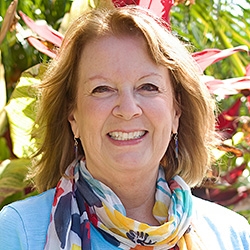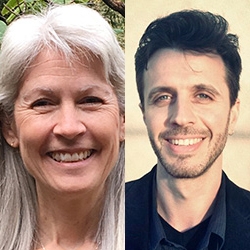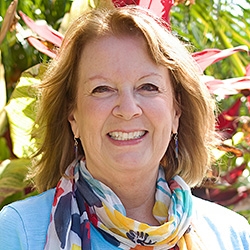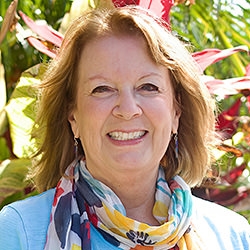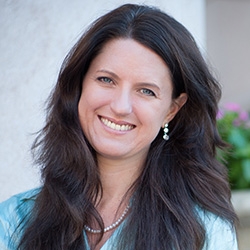

Search Results: needs
-
Trainer Tip: Practicing NVC in situations that are not emotionally charged can give you valuable practice to help you maintain a compassionate consciousness when circumstances are charged. It can help you stay in that consciousness for a longer period of time. You can also practice by naming the needs that you got met in the situations you enjoy.
-
In this book excerpt, Kathleen and Jared offer a path to reach deeper clarity, distinguishing between response and reaction.
-
- Deepen your capacity for self-acceptance and self-compassion
- Bring greater compassion to your relationships
- Increase your capacity for vulnerability and mourning
- Enhance your sense of trusting your own place in life, as well as your purpose
-
Trainer Tip: One of the swiftest ways to close our hearts is having judgmental thinking or looking to get our way. How open are you when you're in this mode? The goal in peaceful living is to approach our relationships with an open heart. Start conversations today with an intention to connect with other people.
-
Even leaders we admire may exhibit behaviors that could be labeled as abusive, at least slightly. This includes not treating followers as equals, using charm, and hiding or twisting truth. In such scenarios a key reason for this is loneliness. If we're using our work and position primarily to gain for appreciation, acknowledgement, and acceptance then we need to examine our own loneliness. We need feedback to keep such conduct in check.
-
Discover how the perennial strength of compassion and the living energy of needs can help you develop resilience in order to remain present with yourself and others amidst today's challenges.
-
Trainer Tip: When we withhold our truth or lie, we can create emotional and physical distance in our relationships. By being honest, we can strengthen relationships. And when someone doesn’t appreciate your honesty, try empathizing with them. It can help to notice how your actions stimulate feelings in other people -- even as they are not the cause of their feelings.
-
Come. Let us journey together into our own authentic Life force: the essential living energy that permeates all of our lives.
Your journey will begin at the center: with the divine / life force, or soul force.
Robert Gonzales shares how this fundamental life energy is the tender expression of your inner being, or soul. It unfolds through the heart as your deepest longings, which manifest themselves in all forms of human needs and values. When you live from the energies of compassion, creativity, love, and clarity – while remaining wholly grounded and aware of needs and values – then you are living your passion… You are living the Self-In-Life.
-
- Adapted from Marshall’s bestselling book and taught in his own words
- Learn how to utilize empathy to safely confront powerful emotions
- Discover how to overcome the blocks to compassion
- Open to your natural desire to enrich the lives of those around you!
-
Miki Kashtan hosted Living Room Radio Show on KPFA Radio 94.1FM in Berkeley, California, USA. Listen as she works with a a woman whose relationship is challenged by what happens when her lover drinks. In this segment, Miki encourages the caller to get support for her stress, find an outlet for it and receive empathy. Miki addresses the challenges of addiction, the self-judgment of trying to meet needs by drinking and the pain this causes for everyone involved. She further suggests that the caller try to connect to the needs he is trying to meet by drinking, and to identify those that are actually being met and those that aren’t.
-
Is there someone you wish was more willing? Try guessing what obstacles they might be struggling with. And allow yourself to feel your grief. As you grapple with your own desire for someone to find their willingness, its essential to recognize that this is about you and your needs. You can also express your needs honestly, make requests for how to collaborate, and be responsive to what they want. Read on for more on this, plus four common ways someone’s willingness might be blocked.
-
The pandemic asks us to examine the way we have always done things. It asks to try something new and notice what happens. This is an opportunity to ask why you have done holidays in a certain way and what needs it met to do it that way. Perhaps it is an opportunity to experiment and see what new things might arise. Read on for questions to ask yourself that might help you process your triggers, "should's", feelings, needs and dilemmas.
-
Where do you feel desperation, resentment, anger about your partner's choices? What do you want to demand of them? Rather than looking for what they're suppose to do, look for your feelings and needs, how would you would respond if you trusted your needs could be met without your partner, and what you choose to do given what your partner offers and does not offer.
-
Ever have a hard time saying "no" to someone, or feel obligated to say yes? Here's an exercise that can help you notice where you are placing yourself as someone who "has to" say yes; the needs in the other person making the request; what you want to say "yes" to (regarding your needs and theirs) by saying "no"; what prevents you from saying "yes"; plus your request and how you might express it.
-
Who are you not use to caring about? Is it those you classify as "other"? Those you disagree with? The lower class? People in power? Those who inflict harm? Yourself? To include everyone's needs fully, not instead of your needs, can transform the either/or paradigm. It can also help us to go beyond so-called "codependency". And it can support us all to live more sustainably on this planet.
-
When you attempt to make a request what limiting beliefs come up? See if you recognize any from this list. Then compassionately observe your body sensations, impulses, feelings, needs, memories, energy, and images. In making the request ensure your request is connected to your needs, is doable, what you want, and not attached to them saying yes.
-
Making decisions from overwhelm can be costly for you and others. Instead, to get distance name overwhelm as it comes. Apply self-compassion. Be suspicious of your impulse to withdraw. Find ways to meet your needs. Tell others about your overwhelm. This may allow more support, connection and trust-building. Plan what to do to meet your needs next time you're overwhelmed. Tweak your plan.
-
When you hear yourself saying that you are being abandoned, turn toward your experience with compassion and curiosity. Check in with your interpretations, feelings, and needs. Reach out for support. This can help dissolve feelings of reactivity and allow perspective. You are then able to make requests of yourself about what you’d like to do differently in the future to honor for your needs when making a choice.
-
You may want to shift power dynamics in intimate and family relationships -- especially if there's longstanding, unprocessed hurts. Reflect on where, when and with whom you tend to enter reactive “power over” patterns. Explore the feelings and needs that are up for you in those contexts. Imagine other ways that could meet your needs in, or before, those moments. In this way, in similar situations you can have more access to choice.
-
Many of us have been raised within a right/ wrong culture. From very young ages, we are asked, "What is wrong?" Yvette Erasmus shares a different view where emotions can be seen as expansion and contraction, where they can help us identify our needs.

Quick Links
Subscription Preferences
Stay In Touch!
Looking for ways to keep up with NVC Academy news, get special offers, free resources, or words of inspiration? Here are five ways to stay engaged:

